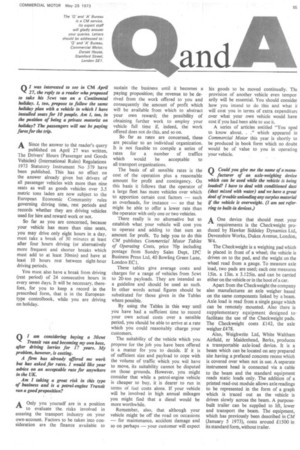Q I am considering buying a 30cwt Transit van and becoming
Page 57

If you've noticed an error in this article please click here to report it so we can fix it.
my own boss, after driving lorries for 17 years. My problem, however, is costing.
A firm has already offered me work but has asked for rates. I would like your advice on an acceptable rate for anywhere In the UK.
Am I taking a great risk in this type of business and is a petrol-engine Transit van a good proposition?
AOnly you yourself are in a position
to evaluate the risks involved in entering the transport industry on your own-account. Factors to be taken into consideration are the finance available to
sustain the business until it becomes apaying proposition; the revenue to be derived from the work offered to you and consequently the amount of profit which will be available from which to abstract your own reward; the possibility of obtaining further work to employ your vehicle full time if, indeed, the work offered does not do this, and so on.
So far as rates are concerned, these are peculiar to an individual organization. It is not feasible to compile a series of rates for a number of traffics which would be acceptable to all transport organizations.
The basis of all sensible rates is the cost of the operation plus a reasonable amount for profit and contingency. On this basis it follows that the operator of a large fleet has more vehicles over which to apportion certain cost factors — such as overheads, for instance — so that he might be able to offer a lower rate than the operator with only one or two vehicles.
There really is no alternative but to establish what your vehicle will cost you to operate and adding to that sum an amount for profit. To help you to do this CM publishes Commercial Motor Tables of Operating Costs, price 70p including postage from Sundry Sales Dept, IPC Business Press Ltd, 40 Bowling Green Lane, London Ed.
These tables give average costs and charges for a range of vehicles from 5cw to 20-ton payloads. They are intended as a guideline and should be used as such. In other words actual figures should be substituted for those given in the Tables where possible.
By using the Tables in this way until you have had a sufficient time to record your own actual costs over a sensible period, you should be able to arrive at a rate which you could reasonably charge your customers.
The suitability of the vehicle which you propose for the job you have been offered is a matter for you to decide. If it is of sufficient size and payload to cope with the volume of traffic which you will have to move, its suitability cannot be disputed on those grounds. However, you might consider that while a petrol-engine vehicle is cheaper to buy, it is dearer to run in terms of fuel costs alone. If your vehicle will be involved in high annual mileages you might find that a diesel would be more worthwhile,
Remember, also, that although your vehicle might be off the road on occasions — for maintenance, accident damage and so on perhaps — your customer will expect
his goods to be moved continually. The provision of another vehicle even temporarily will be essential. You should consider how you intend to do this and what il will cost you in terms of extra expenditure over what your own vehicle would have cost if you had been able to use it.
A series of articles entitled "You need to know about. . ." which appeared in Commercial Motor this year is shortly to be produced in book form which no doubt would be of value to you in operating your vehicle.
























































































































































